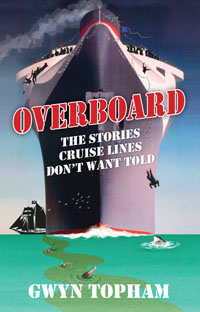Angelo Faliva
The Caribbean island of Aruba, and nearby waters, are the scene of several mysteries famed worldwide. In 2005, Alabama tourist Natalee Holloway vanished after being driven from a local bar by three islanders. In 1998, Amy Bradley of Virginia disappeared from a Royal Caribbean cruise ship as it was docking in Curacao, the morning after the vessel visited Aruba. Neither case has been solved. Just months ago, yet another person went missing from a cruise ship after it stopped in Aruba. Investigators are baffled .. and family members of the missing man suspect that the cruise line knows more than it has revealed, and perhaps has destroyed useful evidence.
Angelo Faliva, in November, was a first cook on the Coral Princess cruise ship; his six-month contract was to end on February 20. The 31-year-old Italian had held positions with the ship's owner, American company Princess Cruise Lines, since 2006, and had sailed in the Caribbean before. He had passed all of the drug tests required of employees, and was not taking any medications. His sister, Chiara Faliva, 23, indicated that he “was very happy” with his job and that he sent her e-mails nearly every day. But on November 24, in the last e-mail she got from him, Angelo said that he had had a dispute with his boss on the ship three days before. That person, a sous chef, filed a formal complaint in the matter, but ship's Captain Mariano Manfuso told Chiara later that the argument was over something trivial, and that the complaint had been canceled.
It is believed that Angelo vanished from the ship on the evening of November 25. That day, he began work at about 4:30 p.m. in the kitchen of Sabatinis, a restaurant on the ship's “promenade” seventh deck. This deck, with several restaurants, is usually highly trafficked with passengers strolling and eating, and security video cameras monitor the area. Around 8:15 p.m., Angelo returned to the kitchen from the dining room, where he had been speaking with two passengers. He was seen entering a lift that went to lower decks, areas open only to employees. There is no security filming of workplaces (except for ship casinos) or non-public areas on board, and shipboard security cameras do not monitor restaurant dining rooms.
Angelo Faliva
Although he said nothing to the staff on duty, this lift is used by workers who are going to dump trash into the ocean. Alessandro Pezzi, another cook who had worked with Angelo on a previous voyage and who shared his crew quarters, told Chiara that employees using these trash-dumping bins must enter certain codes; otherwise an alarm goes off. (No information is available about the size of these bins.) (Cruise ship personnel later told Chiara that the list of diners in Sabatinis that night had been deleted from records, an odd way to treat potential evidence. The cruise line, so far, has not cooperated with the family's attempts to contact passengers and seek information. In fact, although Chiara flew from Italy to Los Angeles in quest of information, and met with cruise line officials on December 7, Manfuso met with her for only 30 minutes.)
The last confirmed sighting of Angelo was when he entered the lift. However, another employee reported seeing Angelo on deck
seven at 6:30 a.m. the next morning. At that time, the Coral Princess was about two miles offshore from Cartagena, Colombia. Since it was operating under the Bermuda flag, Bermuda police were the investigating authorities ... although they did not bother to show up until ten days after Angelo was reported missing. (The FBI subsequently joined the investigation.) And when they did appear, they talked only with one worker at Sabatinis – Pezzi. They told Chiara they believed the employee who said he saw Angelo on deck. But Pezzi told her that Angelo did not return to his cabin on the night of November 25. If he had been on deck seven the next morning, she wonders, how could security videocameras have failed to take note? Or was he filmed, and did the cruise line, for whatever reason, tamper with the recordings before handing them over? Moreover, if this sighting were genuine, how could someone jump or be thrown from an upper deck of a cruise ship at 6:30 a.m., when the sun was up and people were out in public, and not be seen? Why would someone swim two miles to Cartagena when the ship was docking there at 9 a.m. that same day? Why would Angelo walk away from a job he enjoyed?
Bermuda police also told Chiara that a life preserver was missing from deck seven, and that night illumination flares had been ripped off of it and were left on the deck. There is no evidence, however, connecting this to Angelo's disappearance. Nobody taking to the water voluntarily would jettison this gear, and nobody attempting suicide – an idea the family rejects out of hand – would use a life preserver. According to the cruise line there is no evidence on film of who tampered with this life preserver, seemingly leaving in question how effective the security surveillance is. There is no way to rule out that someone may have used this to mislead investigators, if it is connected to the case at all.
Other possible explanations seem even less likely. Could Angelo have been decoyed to a storage area, subdued, put in a crate and taken onshore while cargo and luggage was moved? This is a legitimate hypothesis in the case of Amy Bradley, as there have been several credible reports of her being seen on shore, in a situation of duress, after her disappearance, but no similar sightings have been reported of Angelo. No plausible explanation why someone would want to do this has been advanced. It has been widely reported that drug rings operate on cruise ships; the possibility that Angelo stumbled upon something by accident is plausible. It is worth noting that Julie Benson, a spokesperson for Princess Cruise Lines, said that the crew searched the ship thoroughly. One would like to speak with whatever crew members carried out this search to see if this statement is true. We know that in the case of Amy Bradley, the captain and the head of security assured the family that a thorough search of the entire ship was carried out ... but when the FBI boarded the vessel,, this statement was found to be untrue. The FBI then insisted on a complete search ... after 48 critical hours had passed.
Whatever happened is part of the mystery; what the cruise line and Bermuda authorities have done, have done tardily, and have not done at all is another. Why is it, for example, that (according to an Italian newspaper) the Bermuda police, in an e-mail to Angelo's family two months after his disappearance, said they have not yet examined the data on his laptop computer, camera, or three cell phones because they are “very busy” with other matters? (They did, however, find time to warn Chiara that her family are “on the verge” of harassing (!) the Bermuda police, presumably because of their interest in the fate of their family member.)
It is not known yet whether Bermuda police have checked all, or any, of the surveillance cameras on the ship (one source puts their number at six thousand). Perhaps, since the cruise line told the family that the cameras “didn't show anything,” the police can't be bothered. After all, who are Bermuda police to contradict what a cruise line says? Who are the real law-enforcement authorities? A report says that Angelo's disappearance became known 12 hours after he descended in the lift. Apparently, though, no attempt was made by the ship to backtrack and check the ocean. As the ship's vice captain said: “We obviously cannot stop the cruise.” To whom is that obvious, especially given maritime traditions?
Yet another question: Pezzi told Chiara that on November 26, cruise line authorities cut the padlock to Angelo's desk in his cabin, photographing and noting down the contents. These included his wallet, credit cards, driver's license, a digital camera and mobile phones. All of these items are now in the custody of Bermuda police. But the family also received money and a gold necklace that, Chiara said, Angelo always wore. Pezzi said that neither money nor the necklace were in that drawer. How, then, did the cruise line obtain them? A statement from a public relations person for the cruise line seems to leave everything up in the air. It reads: “This is highly unusual and clearly we are concerned for his safety. It may very well be that he went overboard, but we don't know that for a fact.” So, apparently, Angelo may be on board or may not, despite the thorough search that the crew was said to have carried out. This rather indefinite statement is no more accurate than is the “highly unusual” reference.
In the last nine years, one expert on the cruise industry has reported, 125 people have vanished from cruise ships. Of these, as many as 23 vanished in 2009 alone. The case of Angelo Faliva has received extensive publicity in Europe; it is little known in the United States. That is likely to change: his family are seeking to involve the Italian Foreign Ministry, interest the public prosecutor in his hometown (Cremona), and are doing all that they can to ensure that Angelo will not be left as yet another member of those who have disappeared at sea.
Victims Helping Victims
Together We Are Making A Difference
Partners
Things
You Should Know
Before
You Leave Port
Read
Don't Snooze Before You Cruise
Read
I Just Cant






